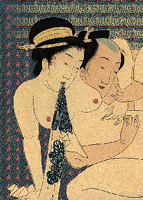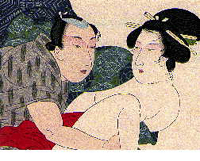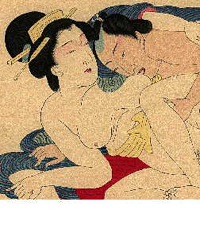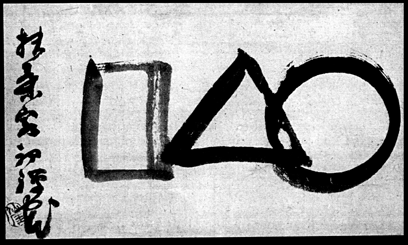In
life, there are many paths to attaining true wisdom.
Zen is one of them.
Sex is another.
This is where the two paths converge.
On first hearing the term Zen Sex, you may
wonder what could possibly be zen about sex. Zen is supposed
to be quiet, tranquil, still as a rock garden. Imagine: Minimalist
sex! Making love without moving! Sounds like a real
turn-on . . . .
And aren't zen monks supposed to be celibate?
They take strict ascetic vows. Technically, can there even
be zen sex?
Zen Sex: The Way of Making Love explains
that Zen Sex does exist, and it's more than minimal--in
fact, it's mind-blowing. For those who want the truth,
Zen Sex is the best sex you can possibly have.
How to get it, and what it can mean for your
life, is what this book is all about.
 We
live in an age obsessed with sex. From news accounts of
politicians' sex lives to Internet pornography
to Viagra to sexual harassment to the latest perversity
on "trash TV" talk shows, we're inundated with
sexual messages and imagery. Sex has been politicized,
criminalized, sensationalized, sold as entertainment, even,
in the AIDS crisis, equated with death. Confusing messages
abound: Sex is immoral. Sex is dirty. Sex is dangerous.
Sex is supposed to be super-orgasmic or something's wrong
with you and this magazine/product/lifestyle will correct
it.
We
live in an age obsessed with sex. From news accounts of
politicians' sex lives to Internet pornography
to Viagra to sexual harassment to the latest perversity
on "trash TV" talk shows, we're inundated with
sexual messages and imagery. Sex has been politicized,
criminalized, sensationalized, sold as entertainment, even,
in the AIDS crisis, equated with death. Confusing messages
abound: Sex is immoral. Sex is dirty. Sex is dangerous.
Sex is supposed to be super-orgasmic or something's wrong
with you and this magazine/product/lifestyle will correct
it.
Lost amid this blather is a simple truth:
Sex is sacred.
For all our obsession with sex--who's getting
it, how often, how good--we forget sometimes that sex connects
us in the most basic way to the source of Creation. All
of us began as a combination of sperm and egg, man and
woman. At its best, sex takes us back to that beginning,
transcending the mere fulfillment of our animal desires
to reveal our inherent divinity as Creators; it becomes
a spiritual endeavor, as profound as any religious rite
or ritual, each act symbolizing the origin of life.
Like sex, the study of zen takes us back to
our origins as well. It says we can awaken to the divine
source at the core of our being, the source from which
all things are born, and in so doing, transcend the limits
of space and time.
 The
ideas of zen date back thousands of years, with origins
in India and China. Although often considered
synonymous with Zen Buddhism, "pure" zen is not
a religion, but a spiritual philosophy. The word zen itself
is Japanese and means "meditation" or "absorption." Traditional
zen practice emphasizes sustained meditative breathing,
but in the largest sense, zen is simply an absorption in
life-the essence of life. Quietude and meditation may be
aspects of zen, but zen itself is vibrantly alive. Its
way is the way of nature, changing like the seasons.
The
ideas of zen date back thousands of years, with origins
in India and China. Although often considered
synonymous with Zen Buddhism, "pure" zen is not
a religion, but a spiritual philosophy. The word zen itself
is Japanese and means "meditation" or "absorption." Traditional
zen practice emphasizes sustained meditative breathing,
but in the largest sense, zen is simply an absorption in
life-the essence of life. Quietude and meditation may be
aspects of zen, but zen itself is vibrantly alive. Its
way is the way of nature, changing like the seasons.
To say that zen has nothing to do with sex
would be to say that sex is unnatural. Nothing could be
further from the truth. The way of zen is to allow nature
to express itself through all of our actions, whatever
they are, in the same way the cherry blossom blooms naturally
in the spring.
Religious
adherents sometimes renounce sex as an earthly desire to
be transcended, and zen monks are
no different. These monks, typically Zen Buddhists, have
formalized an approach to zen using a Buddhist system of
strictures and rules. Entering the monastery, they take
strict vows of asceticism as a means to self-purification.
But "pure" zen decries attachment to religious
orthodoxy or any doctrinaire pursuit of enlightenment.
One of the most revered zen masters in history, Ikkyu Sojun
(1394-1481), mocked the rules of monasteries and their
extremes of self-denial. In poem after poem, he sang the
praises of wine and physical love, of taking a lover and
frequenting brothels. A famous example of his poetry follows:
Ten days
In the monastery
Made me restless.
The red thread
On my feet
Is long and unbroken.
If one day you come
Looking for me,
Ask for me
At the fishmonger's,
In the tavern,
Or in the brothel.
To
Ikkyu, cutting off relations between men and women so as
to attain enlightenment made no sense.
In his philosophy of "red thread zen," sex deepened
the experience of enlightenment. No one can enter this
world without being born of both a man and woman, he said;
we are connected to sex by the "red thread" of
blood at birth. Back and back the red thread goes, long
and unbroken, to the origin of all being. We're of sex.
That fact should be embraced, not avoided, Ikkyu said.
He openly wore his priest's robes to the pleasure quarters
to signify the spiritual nature of his activity:
Me, I am praised as a general of Zen,
Tasting life and enjoying sex to the
fullest!
Every moment, be it in sex or quiet meditation,
offers a chance for zen realization, Ikkyu said. Let anything
and everything be your source of absorption, for zen truth
applies to all things at all times. No matter how you come
to zen-through archery, motorcycle maintenance, flower
arranging, martial arts, guitar playing, or love-making--the
progression toward enlightenment is the same. In Ikkyu's
words,
Many paths lead from
The foot of the mountain
But at the peak
We all gaze at the
Single bright moon
Just awaken to the truth; how and where do
not matter. Sex offers the same opportunity for enlightenment
as anything else.
 So many of us go through life searching for
sex, bored with sex, ashamed of sex, addicted to sex--whatever--never
realizing our potential to awaken and change. But if we
apply the principles of zen philosophy to love-making,
we come to understand the possibilities of spiritual sex--the
potential for a transcendent communion to take place. Through
this communion, the eternal principles that govern the
universe and our lives within it reveal themselves. We
come face to face with Ikkyu's truth and see its daily
workings inside the bedroom and out. In this way, Zen Sex
gives life its very meaning.
So many of us go through life searching for
sex, bored with sex, ashamed of sex, addicted to sex--whatever--never
realizing our potential to awaken and change. But if we
apply the principles of zen philosophy to love-making,
we come to understand the possibilities of spiritual sex--the
potential for a transcendent communion to take place. Through
this communion, the eternal principles that govern the
universe and our lives within it reveal themselves. We
come face to face with Ikkyu's truth and see its daily
workings inside the bedroom and out. In this way, Zen Sex
gives life its very meaning.
Be
warned, this book is not a modern-day Kama Sutra. It will
not teach you ancient love secrets or exercises,
it will not detail sexual techniques to drive your lover
wild in bed. It does not advocate an "anything goes" or "do
whatever gives you pleasure" approach, nor does it
suggest conservatism in your sexual frequency or behavior.
Whether you make love twice a month or twice a day is up
to you. Because zen sex is simply this: "Ordinary" sex-but
done with zen awareness. As the legendary master Rinzai
(a.d. ?-866) put it, true zen is earthy, natural, and nothing
special: "Shit and piss, wear your clothes, eat your
meals, and in all things be ordinary."
Do
not think there is anything wrong with being ordinary.
Quite the contrary. If we look deeply enough
into the ordinary, as zen proscribes, we discover something
extraordinary. This life we've been given, this love within
us, our capacity for feeling ecstasy and giving joy--it's
nothing short of divine. The problem is, too often we take
it for granted. Life can seem so "ordinary" that
our senses become dulled. We keep looking for some extra
zip to our lives, some glass of champagne, when all around
is pure drinking water. Coursing through every living thing
is a vibrant energy, by its very nature a sexual life-force.
We're all born of it, we all manifest it. The more acutely
we become attuned to this "ordinary" energy,
the more we begin to marvel at its dimension and wonder,
the more we feel it and express it in our lives and love-making.
 The challenge of zen is to become so absorbed
that we feel this energy at every moment. In zen thinking,
anything can be the source of meditation, a chance to lose
one's self in absorption, whether praying or, as Ikkyu
preferred, frolicking in bed with your lover. As he wrote,
The challenge of zen is to become so absorbed
that we feel this energy at every moment. In zen thinking,
anything can be the source of meditation, a chance to lose
one's self in absorption, whether praying or, as Ikkyu
preferred, frolicking in bed with your lover. As he wrote,
The autumn breeze of a single night of
love is better than a hundred thousand years of sterile
sitting meditation.
Thus, what makes Zen Sex mind-blowing is not
its promise to deliver a superorgasm, but its potential
to rescramble our brains-to change the way we look at ourselves,
our love-making, and the world. What makes it the best
sex we can possibly have is not its capacity to fulfill
our fantasies, but to so deeply absorb us that all thinking
is forgotten and we feel the perfection of Divine Love.
We arrive at this truth through the Way of
Making Love. The Way of Making Love takes the same transcendent
principles that apply to all zen arts and applies them
to sex. The Way is available to anyone--man or woman, young
or old, married or single, gay or straight. It does not
require a lifelong partner. It can take place anywhere,
any time, with anyone, because zen truth is available at
all times, for any person willing to practice. Realizing
that truth is strictly up to the individual: You.
No
words can teach you how to make love, they can only guide
you. The actual learning will be up to you,
for Zen Sex is all in the doing. As the zen saying goes, "Paths
cannot be taught, they can only be taken."
For the purposes of this book, the Way of
Making Love is organized into three sections: mind, body,
and spirit. Each can be identified by its own symbol--the
geometric shapes of the square, triangle, and circle. The
use of those shapes is based on a classic painting by the
zen master Sengai Gibon (1751-1837), whose primordial Circle,
Triangle, Square evokes the eternal mystery of zen.

Although Sengai never explained the meaning
of his painting, Zen Sex employs his symbology to represent
the three aspects of the Way of Making Love.
The mind is denoted by a square, which represents
the box from which our thinking needs to escape.
The body is denoted by a triangle, which
represents the temple of our physical form.
The spirit is denoted by a circle, which
represents its all-encompassing nature, with no beginning
and no end.
Do not be mistaken, though. What applies to
one applies equally to the others, for there are no divisions
in the Way. To be truly absorbed in love-making, the whole
of you must be present.
Just make love in the fullest sense of those
words, feeling the Power of Love in all its glory. Then,
when you've achieved sweet release, you can lie back in
bliss on this spinning globe, breathing deeply, and from
the core of your being whisper in your lover's ear:
I felt the earth move.
To order your copy of Zen Sex, click here.
Zen Sex
Table of Contents
Introduction: What is Zen Sex?
I. The Seven Ways of the Mind
The Way of Desire
The Way of Fantasy
The Way of Discovery
The Way of Initiating
The Way of Anticipation
The Way of Surprise
The Way of the Familiar
II. The Seven Ways of the Body
The Way of Entering
The Way of Accepting
The Way of Touch
The Way of Scent
The Way of the Eyes
The Way of the Mouth
The Way of the Cry
III. The Seven Ways of the Spirit
The Way of Interplay
The Way of Giving
The Way of Clouds
The Way of Union
The Way of Release
The Way of Creation
The Way of Birth and Rebirth
Epilogue: The Way of Making Love
For readers interested in more detail on the
source of quotations used in the book, click here.



